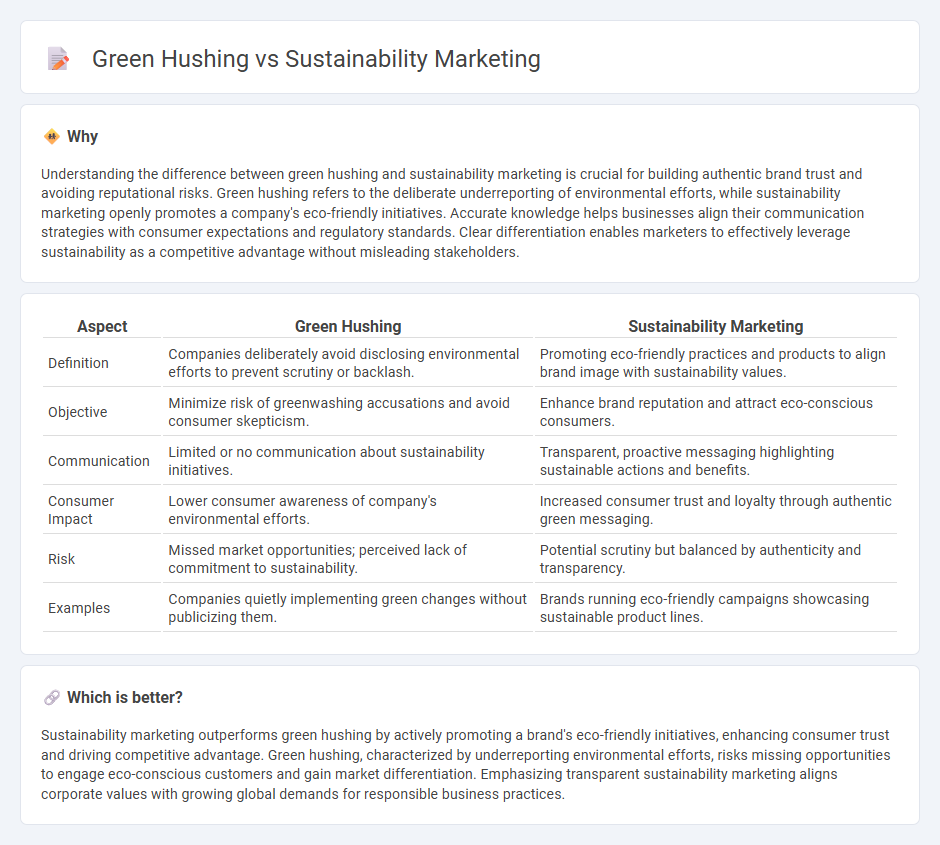
Green hushing occurs when companies intentionally underreport or conceal their environmental initiatives to avoid scrutiny or criticism. In contrast, sustainability marketing transparently promotes eco-friendly practices and products to build consumer trust and enhance brand reputation. Explore the distinct strategies and impacts of green hushing versus sustainability marketing for a deeper understanding.
Why it is important
Understanding the difference between green hushing and sustainability marketing is crucial for building authentic brand trust and avoiding reputational risks. Green hushing refers to the deliberate underreporting of environmental efforts, while sustainability marketing openly promotes a company's eco-friendly initiatives. Accurate knowledge helps businesses align their communication strategies with consumer expectations and regulatory standards. Clear differentiation enables marketers to effectively leverage sustainability as a competitive advantage without misleading stakeholders.
Comparison Table
| Aspect | Green Hushing | Sustainability Marketing |
|---|---|---|
| Definition | Companies deliberately avoid disclosing environmental efforts to prevent scrutiny or backlash. | Promoting eco-friendly practices and products to align brand image with sustainability values. |
| Objective | Minimize risk of greenwashing accusations and avoid consumer skepticism. | Enhance brand reputation and attract eco-conscious consumers. |
| Communication | Limited or no communication about sustainability initiatives. | Transparent, proactive messaging highlighting sustainable actions and benefits. |
| Consumer Impact | Lower consumer awareness of company's environmental efforts. | Increased consumer trust and loyalty through authentic green messaging. |
| Risk | Missed market opportunities; perceived lack of commitment to sustainability. | Potential scrutiny but balanced by authenticity and transparency. |
| Examples | Companies quietly implementing green changes without publicizing them. | Brands running eco-friendly campaigns showcasing sustainable product lines. |
Which is better?
Sustainability marketing outperforms green hushing by actively promoting a brand's eco-friendly initiatives, enhancing consumer trust and driving competitive advantage. Green hushing, characterized by underreporting environmental efforts, risks missing opportunities to engage eco-conscious customers and gain market differentiation. Emphasizing transparent sustainability marketing aligns corporate values with growing global demands for responsible business practices.
Connection
Green hushing occurs when companies deliberately underreport or avoid publicizing their sustainability efforts to evade criticism or scrutiny, affecting transparency in sustainability marketing. Sustainability marketing aims to promote eco-friendly products and practices, but green hushing undermines its effectiveness by limiting the visibility of genuine environmental initiatives. This connection highlights the tension between authentic corporate social responsibility communication and the strategic withholding of information in marketing campaigns.
Key Terms
Sustainability Marketing:
Sustainability marketing promotes eco-friendly products and practices by transparently communicating a company's commitment to environmental responsibility, enhancing brand reputation and consumer trust. It leverages data on sustainable sourcing, carbon footprint reduction, and circular economy initiatives to engage environmentally conscious customers effectively. Discover how embracing sustainability marketing can drive both business growth and positive environmental impact.
Triple Bottom Line
Sustainability marketing emphasizes promoting products and practices that balance environmental, social, and economic benefits, aligning with the Triple Bottom Line framework. Green hushing involves deliberately downplaying or hiding sustainable initiatives to avoid scrutiny or criticism, which can undermine transparency and stakeholder trust. Discover how companies navigate these approaches to authentically enhance their Triple Bottom Line performance.
Corporate Social Responsibility (CSR)
Sustainability marketing highlights a company's commitment to Corporate Social Responsibility (CSR) by transparently promoting eco-friendly practices and social initiatives that resonate with conscious consumers. Green hushing, in contrast, involves deliberately minimizing or withholding CSR communication to avoid scrutiny or negative backlash, which can undermine brand trust and stakeholder engagement. Explore effective strategies to balance authentic sustainability marketing with responsible CSR disclosure.
Source and External Links
Sustainability Marketing: Definition, Examples & Marketing Mix! - Sustainability marketing promotes products designed to be socially or environmentally conscious by integrating sustainability into brand identity, educating consumers, and highlighting eco-friendly features to attract environmentally conscious customers.
What Is Sustainable Marketing? Definition + Examples - Shopify - Sustainable marketing is about promoting a business's environmental and social responsibility efforts, helping build consumer trust and loyalty by demonstrating positive impacts on society and the environment.
What is sustainability marketing? Definition and strategies - Indeed - Sustainability marketing, or green marketing, focuses on mindful promotion of businesses' environmental and social impacts through consumer-oriented and customer-value strategies to maximize consumer satisfaction with eco-friendly benefits.
 dowidth.com
dowidth.com